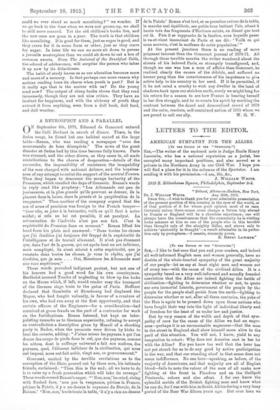A RETROSPECT AND A PARALLEL.
ON September 6th, 1870, Edmond de Goncourt entered the Cafe Brebant in search of dinner. There, in the Salon rouge, he found but one habitue seated at the large table—Renan, who was reading a newspaper " avec des mouvemeas de bras deeesperes." The news of the great disaster at Sedan had by this time become fully known. Paris was stunned, and the other diners, as they came in, all made contributions to the chorus of desperation—details of the surrender, the impossibility of resistance, the incapability of the men charged with national defence, and the hopeless- ness of any attempt to enlist the support of the neutral Powers. Then they began to denounce the savage barbarity of the Prussians, which recalled the days of Genserie. Renan's words in reply read like prophecy : "Lee Allemande oat pea de jouissances, et la plus graude qu'ile peuvent se dormer, ils le. placent dans la halite, dans la pensee et la perpetration do la, vengeance." Then another of the cotnpanj argued that the use of arms of precision was foreign to the French temper- " firer vile, se jeter h la baionette, voila, ce faut h. notre soldat ; si cela ne lui est possible, it eat paralyse. La inecanisation de l'individu n'est pas son fait. C'est la, superiorite du Prussien dans ce moment." Renan lifted his head from his plate and answered : " Dans toutes lee chosen que j'ai etudiees j'ai toujours etc• frappe de le. superiorite de l'intelligence et du travail allemand. II n'est pas etonnant quo, dans d'art de la guerne, qui est apres tout un art inferieur, mais compliqne, ils aka atteint a cette superiorite, que je conetate dans toutes les °hoses, je vous le repete, que j'ai etudiees, quo je sale. . . . Oui, Messieurs lee Allemande sont tine race superieure."
These words provoked indignant protest, but not one of his hearers had a good word for his own countrymen. Berthelot accused Trochu of neglecting to blow up the locks on the Marne which, if left, would render easy the transport of the German siege train to the gates of Paris. Nefftzer declared that Gambetta at Strasbourg had displaced the Mayor, who had fought valiantly, in favour of a creature of his own, who had run away at the first opportunity, and that certain officers of the Engineers—for a consideration—had connived at gross frauds on the part of a contractor for work on the fortifications. Rotten listened, but kept on inter- polating remarks as to German superiority, refusing to accept as contradiction a description given by Mesnil of a shooting party in Baden, when the peasants were driven by kicks to beat the coverts, adding : " J'aime mieux les payeans h qui l'on donne des coups de pieds dans le cal, que des payeans, commie les nOtres, dont le suffrage universe' a fait nos maitres, des paysans, quoi, l'element inferieur de la civilisation, qui noun ont impose, nous oat fait subir, vingt ans, ce gouvernement."
Goncourt, excited by the terrible revelations as to the corruption of the State poured out by these men, his intimate friends, exclaimed : "Then this is the end; all we have to do is to raise up a fresh generation which will take its revenge." These words roused Renan's anger. " Non, non,' he cried, rising with flushed face, non pas Ia vengeance, perisse la France, periese la Patric, it y a an-dessus le royamne du Devoir, de la Raison.' Non, non,' hurle tonic la table, 'il n'y a rien au-dessus de la Petrie.' Renan West leve, et se promene autour de la table, la march() mal equilibree, see petits bras battant l'air, citant h haute voix des fragments d'Ecriture saints, en disant que tout eat ld. Pais it se rapproche de la fenetre, sous litquelle passe le va-et-vient insouciant de Paris et me dit: ce qui nous sauvera, west la mollesse de cette population.' " At the present juncture there is no reading of more poignant interest than the Goncourt journal of 1870-71. All through those terrible months the writer wandered about the streets of his beloved Paris, so strangely transfigured, and, though no one was less a man of affairs than Goncourt, he realized clearly the causes of the debciele, and suffered no keener pang than the consciousness of his impotence to give active help to his country in her need. If it be permitted, if it be not rated a cruelty to wish any dweller in the land of shadows .back upon our stricken earth, surely we might long for his return for a season to see how France is bearing herself in her dire struggle, and to re-create his spirit by marking the contrast between the dazed and demoralized crowd of 1870 and the calm, resolute, self-contained nation of 11315 whom we


































 Previous page
Previous page